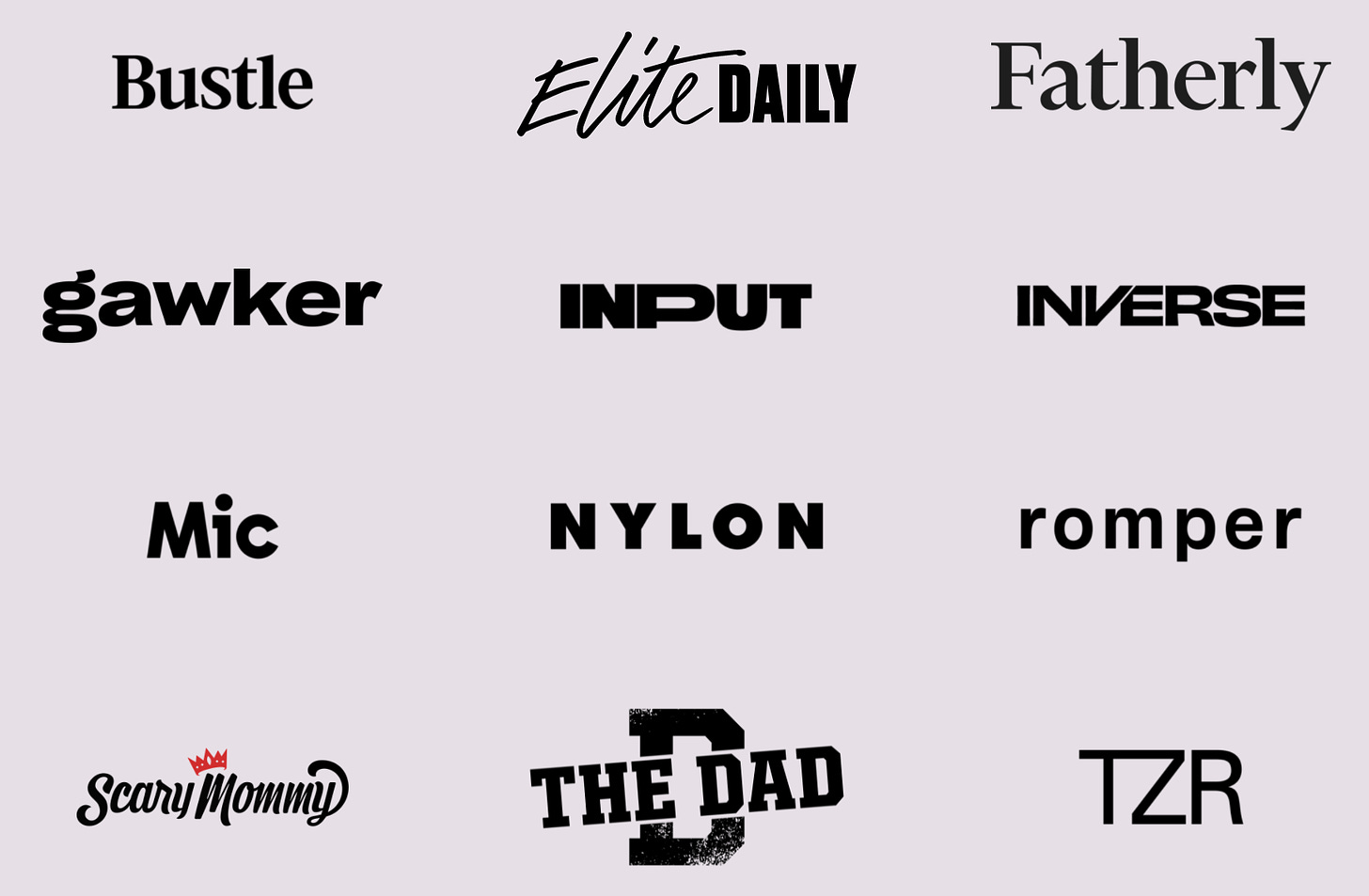I’m on Twitter—I know—it’s a hell hole where discourse goes to die, but alas, I often find myself there. I see an image of Elijah Wood which catches my eye. Below his image is the title to an accompanying news story from a website called Inputmag: Elijah Wood touted a newly acquired NFT. A racism scandal ensued.
This title was concocted for ideal click-ability in this year of our (meme) Lord, 2021. It has the trifecta: 1. A celebrity 2. Something in regard to a blockchain 3. Something in regard to social justice or injustice or cancel culture. It’s a bear trap covered in honey and salmon and I am the bear.
I clicked the link. A rather uninteresting tale ensues about Mr. Wood having bought an NFT by an artist who used to make racist cartoons—and Mr. Wood then selling the NFTs once he was informed of the cartoonist’s past.
The magazine running the article, Input, had a clean website with large photographs, hip style, and engaging fonts. The magazine covers Tech, Culture, Gaming, and Style. It has reviews and guides and features. It matches—at least from an aesthetic standpoint—professionalism with coolness. All of this made me pause and think, “what the fuck is Input mag?”
A small investigation unfolds. I click the about page. It takes me to an entirely different website, called BDG, which stands for Bustle Digital Group. Bannered across the top of the page, below a slideshow of dramatic, albeit vague, high definition photographs, are the words, “The Fastest-Growing Publisher in Modern Media.”
Below this presumably self adorned title, is the following statement:
We work with creators to uncover issues and stories that matter through the lens of authenticity, inclusivity, and conversation. An audience-first, personalized approach allows us to speak to the many or the few, united by a boundless curiosity about the changing world and our place in it.
Then below this corporate, feel-good drivel are some statistics: 13 Leading Media brands, 100 million Readers, 122 million social fans.
BDG’s thirteen brands are Bustle, Elite Daily, Fatherly, Gawker, Input, Inverse, Mic, Nylon, Romper, Scary Mommy, The Dad, TZR, and W.
So I suppose that answers my question. Input, isn’t really a magazine. It’s one of Bustle Digital Group’s many arms of influence—which they surely use, not to deliver meaningful news, but to target specific audiences with clickbait time wasters for the purposes of selling ads to a particular market.
With my mystery solved and my faith for humanity somehow lower than it was before, I move on with my life and leave BDG’s about page and Input in the rearview.
Days later, I’m watching Succession
Don’t worry. There are no spoilers ahead.
And for those of you who haven’t had the pleasure of watching, Succession, is an HBO show with a stellar ensemble cast. It’s about the Roy family—a Murdoch like, billionaire, powerhouse family—which owns Waystar RoyCo, a fictional media conglomerate that has a variety of businesses within its empire. Those businesses include but are not limited to cruise lines, theme parks, and a FOX News type channel called ATN.
Throughout the series, ATN proves to be a valuable asset for the Roy family, not only monetarily, but politically. They wield the mass media at their finger tips—using it like a deadly bludgeon to crush opposing narratives, or as a threat to ward off those who want to diminish or topple their empire.
Most interestingly, the Roy’s ruthless patriarch, Logan (Brian Cox), often uses ATN to enter a quid pro quo with the White House. Keep the nose of the legislation and the Department of Justice out of Waystar Royco’s business, Mr. President, and ATN won’t obliterate your approval ratings.
Unfortunately, it feels as though Succession’s portrayal of the chess match between corporate and governmental elites is accurate—it might well be the closest the general population gets to understanding how the propaganda puppet strings are pulled.
I started thinking about who’s pulling the strings at CNN and FOX and even at BDG’s 13 Bullshit Brands—and for what reason and for who? And I remembered Bezos owns the Washington Post. An idea was forming for an article (this article) but then…
Business Insider Wrote About Dave Portnoy
On November 4th, Business Insider wrote a—well it depends on who you’re asking. Some might say it was a fair investigative report on the Barstool Sports founder, others a damning expose, while others call it a hit piece.
For those unfamiliar, Barstool Sports is a formidable media network of sports related content—it doesn’t have a TV network yet, but it has a bevy of podcasts, internet personalities, and an army of dedicated fans. If Barstool was once an upstart, it is now a major player.
The Business Insider article alleged that Portnoy was a sexual deviant, who exhibited predatory behavior —although it didn’t allege that he committed any sexual crimes. It also painted Barstool Sports as an unsafe and unsavory establishment.
To be blunt, I don’t really care about the contents of the article. I am not here to exonerate or indict Dave Portnoy—I am also not interested in vetting the legitimacy of the articles claims nor do I care to assess the ethics of the journalism at hand.
I am more interested in the birds eye view of the situation. There are plenty of people with power who have less than angelic or even abhorrent behavior. So why Dave Portnoy? Were Dave Portnoy’s actions as despicable as say, Harvey Weinstein? Was this a reckoning that needed to come? Or was it just juicy? Then of course we could ask why now? And why Business Insider?
It had celebrity and it had scandal and that combination gets clicks. Business Insider knows that, which is probably why there was a pay wall blocking its piece on Mr. Portnoy, and a massive sale on subscriptions. So was this more about driving engagement? Or was this journalistic integrity and prowess as we’ve seen with say, Ronan Farrow?
Did it have anything to do with the stock market? Barstool is being acquired by Penn National Gaming, which already owns a 36% stake in the sports media company. When the article was released, the Penn stock dropped dramatically. A lot of people lost a lot of money—unless of course, you bet against the stock. In which case, you’ve made a boat load.
Unusual Whales—a service which helps small time investors “hunt unusual market activity”—reported that large players in the market bet against $PENN prior to the release of the report, presumably meaning they were aware of the article’s existence.
You can go down this rabbit hole nearly infinitely. The tricky part is that there are no unbiased players—what can truly be substantiated? Portnoy and his band of Barstool fanatics will do anything to prove Business Insider is wrong or corrupt, and that their leader is infallible. Business Insider will do nothing except try to bring in more subscribers—and cares not to comment on the validity of its reporting, even if there are legitimate concerns.
So what news am I supposed to trust?
That’s the larger question here, and it’s a complicated one. Information is important. But vetting one piece of information against an infinite stack of it is difficult—and that’s the reality we now face.
When the news was hindered by its delivery system—for instance, when it’s most effective dissemination was through printed paper—there was an inherent, and perhaps vital bottleneck on news.
There was limited space on a page—so it would be in the editors’ and readers’ best interest for that page to be filled with the most important news—the news which would provide valuable insight to the goings-on in the readers’ environment.
But now—how much of the information we receive is at all valuable in our day to day life? Does it matter to us personally that Kim K was seen holding hands with Pete Davidson? Or that Elijah Wood bought and sold some NFTs? Will those stories save lives or even make lives better?
In theory the only news that we should find valuable, is news that effects us directly. Two hundred years ago, that probably just meant news of our town, of the people in it, or of the immediate environment around it. Beware of the mountain lion prowling at night. The ship bringing tea from Europe has been delayed.
Not so long ago, there was less room for frivolous information. But that’s no longer the case. Now, we want to know about our sports team. We want to know about movies being made. We want to know about the companies we’re invested in.
How are we doing with so much information clutter in the mind? How often now does the really important information slip by? How often do bills get passed or are executive orders signed—by either political party—without the populace knowing at all how it might effect them? Or maybe the populace is presented one small part of how it will effect them—and so we think we know what’s happening on the chess board, but we only know the movement of a single piece. Some of the bills congress passes are 1400 pages long. How many people even read books these days? How many generations hence will it be when we can no longer discern between tabloid and scientific journal?
Information has become a product, when it once was a precious tool and free press is locked in a cage—it was once a noble service, a crucial check and balance in the economy of accountability and honesty, and now it’s one of our greatest scourges.
How do we combat this? For one, we need independent media—companies who aren’t owned by puppet masters influencing the information economy for their own gains. We need unsexy, unspun media. We need truth.
And two, we must act—as we are far too often asked to do—as conscientious consumers. It is unfortunate that what’s profitable and what’s right are infrequently compatible, and that the market is designed to bend to profits. But humans control the market. Just as impossible meat has become more widely available due to its increase in demand—so too can good journalism.
We just have to demand it.
Modern Anxiety is a newsletter about culture, media, and mental health. If you enjoyed this edition, I would greatly appreciate if you shared it with someone you know! And if you’re not already, consider subscribing (for free) to receive future editions straight to your email.









The Free Press Is Locked In A Cage